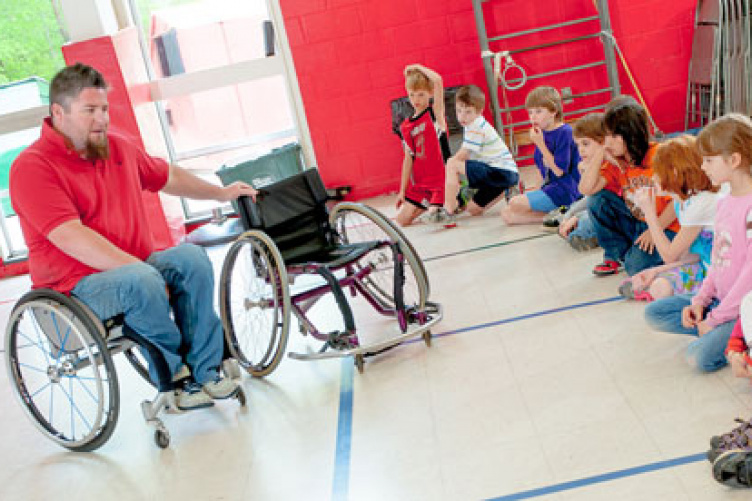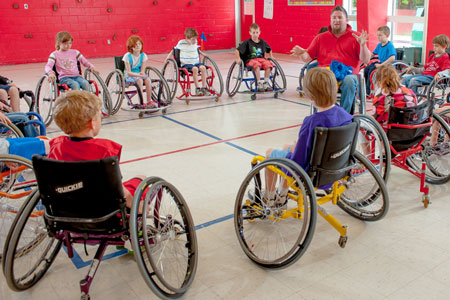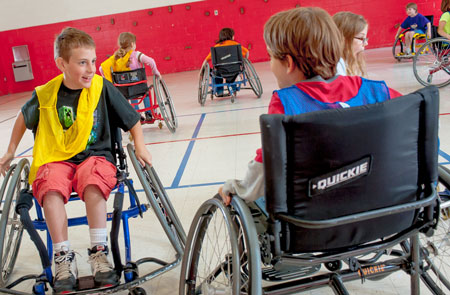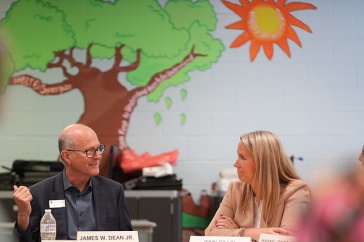
|
|
What’s a gym class with no running, skipping, jumping, or even walking?
If Chandler Bullard is in charge, it’s a cutthroat game of sharks and minnows, a thrilling bout of handball, and an exhausting session of mastering new skills.
Bullard, who leads similarity awareness programs for UNH’s Northeast Passage, travels to up to 20 elementary, middle and high schools each year to let students understand what it’s like to use a wheelchair, as he does. “It’s one of those experiences not many people will have,” he says. “We hope they leave here wanting to accept people with disabilities; to see, oh, that person can have fun in a wheelchair like I did.”
The message of fun resonated with students at Portsmouth’s Donedero elementary school, which Bullard visited recently for a week of education, awareness, and fun.
Wheeling up to a class of second-graders, Bullard introduced himself by deftly anticipating their burning question. “I hurt my back many years ago and I don’t use my legs like you guys do,” he said. “My chair becomes my legs. If I didn’t have this I would become the biggest couch potato ever.” With his tough-cool demeanor and hair spiked into a shark fin, Bullard commands attention and respect, but the students couldn’t take their eyes from the 15 wheelchairs gathered at one end of the gym.
So with a call of “Let’s start this thing!” controlled chaos broke out and students raced toward the wheelchairs and test-drove them around the gym, seemingly forgetful of Bullard’s admonition not to willfully bash into each other.
Just when it seemed gym class couldn’t get any more fantastic, Bullard introduced the class to Hero Tag -- “It’s a game I invented so of course it’s awesome” – and the gym exploded into a spinning swirl of youthful energy.
“They love it,” said Dondero physical education teacher Heidi Hughes of Bullard’s second visit to the school. “They can’t wait for him to come back again.”
It’s a sentiment not unique to Dondero, according to Bullard. “It’s got a 99.9 percent success rate with kids,” he says. “It’s a great equalizer. Everyone is on equal playing ground.”
|
|
Indeed, a second-grader who spent several weeks in a wheelchair this winter was the star of the day, cashing in on the experience foisted on him after he broke his leg.
“I’ve been told there are kids who never participate in gym class who love this,” said Dondero principal Kate Callahan. “We noticed that the kids who were more athletic were more hesitant.”
Bullard has been conducting similarity awareness programs with Northeast Passage since 2007. In addition to traveling to schools, he leads regular wheelchair court sports evenings at UNH’s Hamel Recreation Center, open to participants with and without disabilities. This spring, 40 UNH students came out for wheelchair ultimate Frisbee, one of the most popular offerings yet.
Similarity awareness is a key component to Northeast Passage’s mission, which is to create an environment where people with disabilities can enjoy recreation with the same freedom and independence as their non-disabled peers.
“There are two sides to making the world a better place for people with disabilities,” says Northeast Passage executive director and founder Jill Gravink. “One is to give people with disabilities the skills, opportunities and resources they need to be successful. The second is to help non-disabled people see the similarities instead of the differences between themselves and their peers with disabilities. By doing this we create an environment that is open, educated and understanding.”
And, judging from the mood in the Dondero school gym, fun. “Wheelchairs are awesome!” one boy exclaimed as he filed back to his classroom.
“It’s so cool that you can spin around and go backwards,” echoed his classmate. “I think it would be cool to be in a wheelchair,” he said, then added, “except I wouldn’t like the part where I break my leg.”
Originally published by:
UNH Today
-
Written By:
Staff writer | Communications and Public Affairs





















































